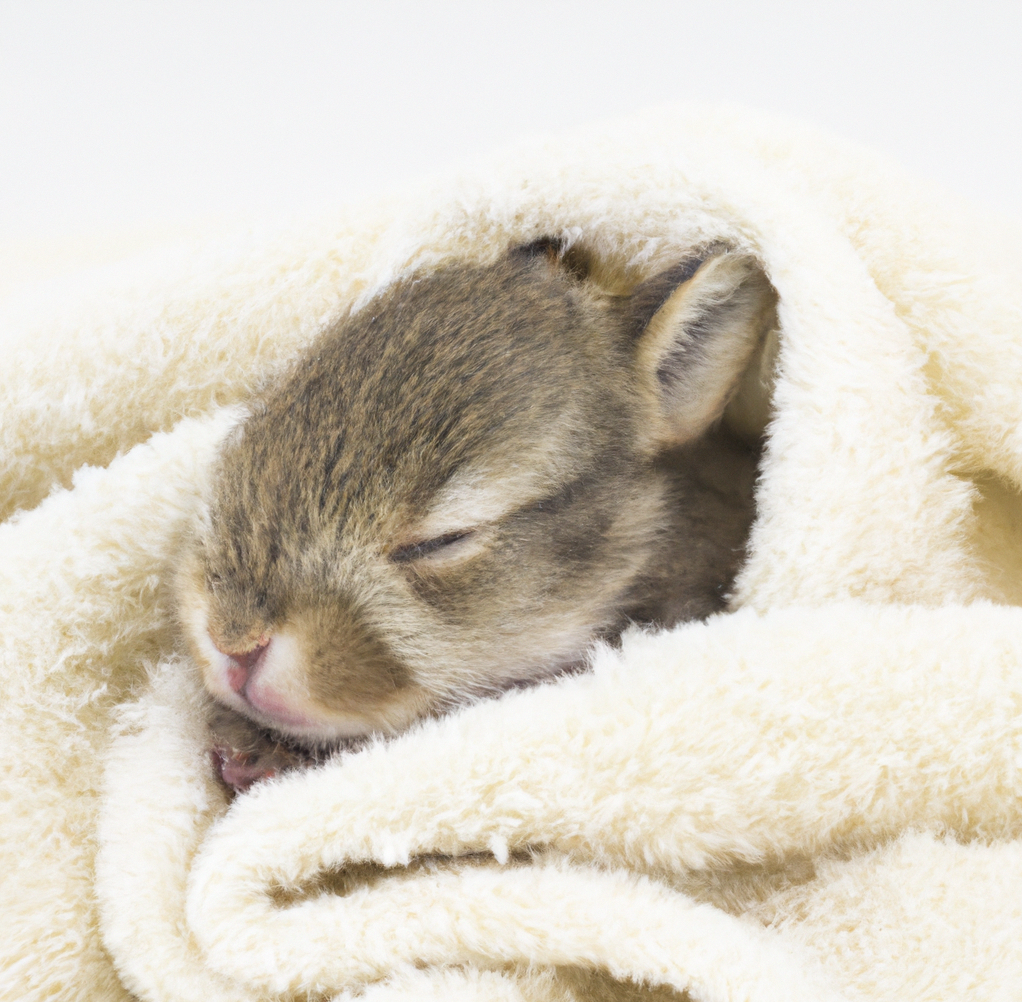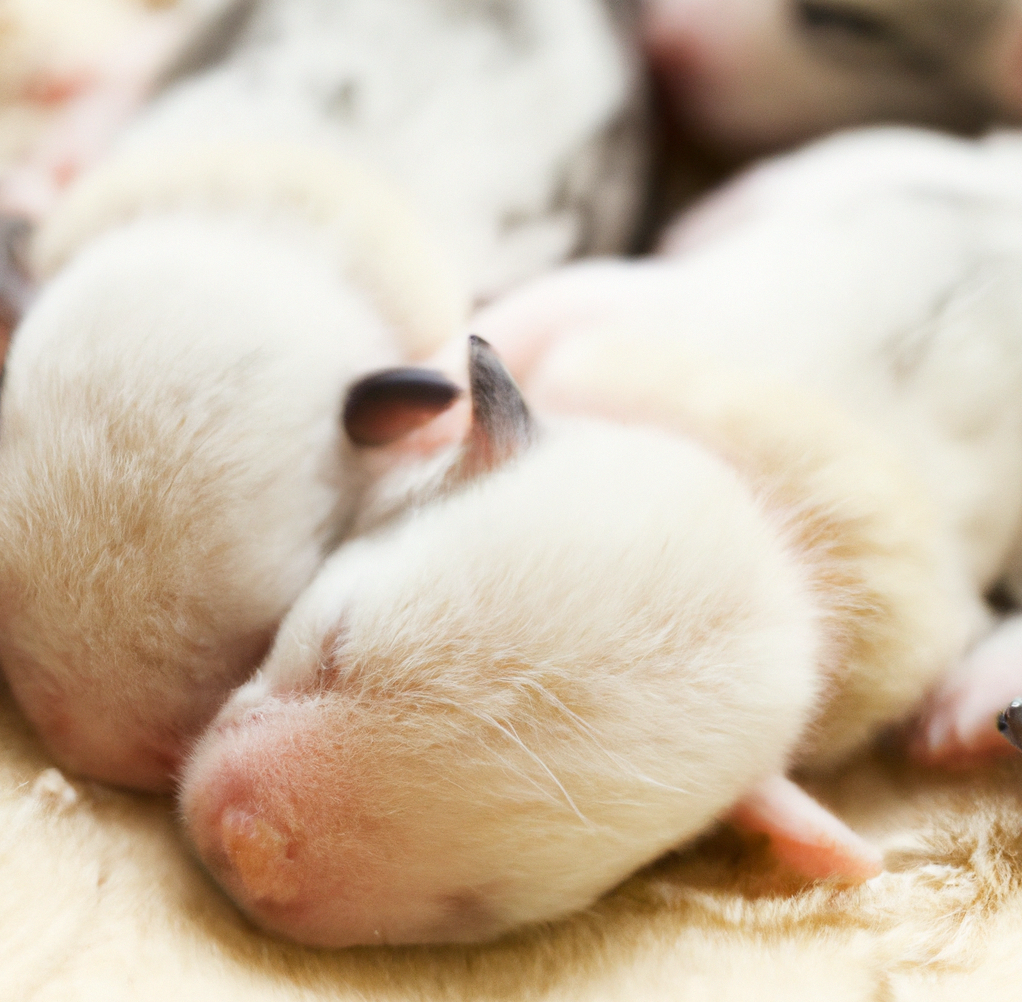If you have just welcomed a newborn baby rabbit into your home, you may be wondering how to make your new furry friend go to the bathroom. It is important to know how to make a newborn baby rabbit poop in order to ensure their health and well-being. In this guide, we will discuss the best ways to encourage a newborn baby rabbit to poop, including providing them with the right diet, creating an ideal environment, and learning how to stimulate their digestive system. With the right knowledge and care, you can help your new rabbit have healthy pooping habits.
Tips For Encouraging Poop in Newborn Baby Rabbits
1. Ensure that the baby rabbit has an adequate diet. A healthy diet should include hay, fresh vegetables, and high-quality pellets.
2. Provide a warm, safe environment for the baby rabbit. This will help them to feel safe and comfortable enough to poop.
3. Use a litter box. Place the litter box in an area where the rabbit is accustomed to spending time. You can use a commercial rabbit litter or even just hay.
4. Place the baby rabbit in the litter box after feedings. This will help them to associate the litter box with pooping.
5. Handle the baby rabbit gently, but firmly. Holding them in your arms and stroking their back can help to stimulate their digestion and encourage them to poop.
6. Be patient. It may take a few days for the baby rabbit to become accustomed to their new environment and routine, so don’t give up hope.
7. If all else fails, contact your veterinarian. They can provide advice and assistance in helping your little one learn to poop.
The Importance of the Newborn Baby Rabbit’s Diet in Promoting Poop
Providing the correct nutrition for a newborn baby rabbit is essential for its growth and development, as well as for promoting healthy poop. This article will discuss the importance of diet and provide some tips on how to ensure that a newborn baby rabbit is getting the nutrition it needs.
The diet of a newborn baby rabbit should consist of a high-quality hay, fresh vegetables, and limited amounts of pellets. Hay should provide the majority of the baby rabbit’s diet, as it is high in fiber and helps to keep the rabbit’s digestive system healthy. Fresh vegetables should be given in moderation, as they are high in vitamins and minerals, and are beneficial for the baby rabbit’s overall health. Pellets should be fed in small amounts, as they are high in calories and can lead to obesity if fed in excess.
A diet rich in fiber is important for promoting healthy poop in a newborn baby rabbit. Fiber helps to keep the digestive system running smoothly and ensures that the rabbit is able to pass waste easily. Hay is the best source of fiber for a baby rabbit, as it helps to keep the digestive system regulated. Fresh vegetables can also be beneficial for adding additional fiber to a baby rabbit’s diet, as well as providing additional vitamins and minerals.
In addition to a healthy diet, it is important to make sure that a baby rabbit is getting enough exercise. Exercise helps to keep the digestive system functioning properly and can help to promote healthy poop. Exercise can include running around in an enclosed area, such as a playpen, or playing with toys.
Finally, it is important to keep a baby rabbit’s enclosure clean in order to promote healthy poop. A dirty enclosure can lead to digestive issues, as bacteria and parasites can build up. It is important to clean the enclosure regularly and make sure that it is free of any waste.
Providing a newborn baby rabbit with the proper nutrition and exercise is essential for its health and development. A diet that is rich in fiber and low in calories, combined with regular exercise, will help to promote healthy poop in a baby rabbit.
How to Transition Your Newborn Baby Rabbit to Solid Foods to Help Stimulate Poop

Newborn baby rabbits require special care to ensure that they grow and thrive. In addition to providing fresh water, hay, and a high-quality diet, transitioning the baby rabbit to solid foods can help to stimulate the production of poop. This article will provide an overview of how to transition your newborn baby rabbit to solid foods.
The first step in transitioning your newborn baby rabbit to solid foods is to introduce them to hay. Hay should be introduced as soon as possible, as it provides essential fiber for a baby rabbit’s digestive system and helps to stimulate the production of poop. Additionally, hay can help prevent the baby rabbit from becoming constipated. When introducing hay, provide your baby rabbit with a variety of options, such as timothy, orchard, and oat hay.
Once your baby rabbit is comfortable with hay, you can begin introducing other solid foods. Start with a small amount of alfalfa pellets and gradually increase the portion size. As your baby rabbit becomes used to the pellets, you can introduce other solid foods such as fresh vegetables, fruits, and herbs. When introducing new foods, start with small amounts and watch for signs of digestive upset, such as decreased appetite, vomiting, or diarrhea. If any of these signs are observed, discontinue feeding the food and consult a veterinarian.
Finally, it is important to provide your baby rabbit with fresh water. Change the water daily and keep the water bowl clean to prevent the growth of bacteria. Additionally, you should monitor your baby rabbit’s water intake to ensure they are drinking sufficient amounts of water. If your baby rabbit is not drinking enough water, consult a veterinarian.
In conclusion, transitioning your newborn baby rabbit to solid foods can help to stimulate the production of poop. To do this, start by introducing hay, then gradually add alfalfa pellets and other solid foods. Finally, make sure to provide fresh water daily and monitor your baby rabbit’s water intake. Following these guidelines will help ensure that your baby rabbit grows and thrives.
How to Safely and Effectively Administer Laxatives to a Newborn Baby Rabbit in Order to Promote Bowel Movements
As a responsible pet owner, it is important to understand how to administer a laxative to a newborn baby rabbit in order to promote bowel movements. This guide will help you safely and effectively give your rabbit a laxative so that it can be healthy and happy.
First, it is essential to understand why a newborn rabbit may require a laxative. Generally, rabbits may need a laxative due to constipation, which can be caused by a variety of factors such as dehydration, an inadequate diet, or a lack of exercise. In order to ensure that your rabbit receives the best care possible, it is important to address the cause of the constipation before administering a laxative. If the underlying cause is not addressed, the rabbit may develop further health issues.
Once the cause of the constipation is identified and addressed, you can safely administer a laxative to the newborn baby rabbit. The preferred laxative for rabbits is mineral oil, which can be purchased at most pet stores. It is important to ensure that the mineral oil you purchase is specifically formulated for rabbits. The recommended dosage for a newborn rabbit is 0.2 mL per 2.2 lbs of body weight given orally once per day. It is important to note that only pure mineral oil should be used, as any additives could be toxic to your rabbit.
When administering the mineral oil, you should use a syringe or an eyedropper to ensure an accurate dosage. Start by measuring the correct amount of mineral oil for your rabbit and then gently lift the rabbit’s chin. Place the tip of the syringe or eyedropper at the corner of the rabbit’s mouth and slowly release the oil. Once the oil has been given, it is important to rub your rabbit’s throat to ensure it has been swallowed.
If the laxative is administered properly and the underlying cause of the constipation is addressed, your rabbit should have a bowel movement within 24 hours. If this does not occur, it is important to consult your veterinarian for further advice.
By following these steps, you can safely and effectively administer a laxative to a newborn baby rabbit in order to promote bowel movements. It is important to remember to address the underlying cause of the constipation and to always consult your veterinarian for further advice.
Common Causes of Constipation in Newborn Baby Rabbits and How to Treat It Appropriately
Constipation is a common problem in newborn baby rabbits and can be caused by a number of factors. These include dehydration, stress, an improper diet, and insufficient fiber intake. It is important to address the root cause of the constipation in order to effectively treat it.
The most common cause of constipation in newborn baby rabbits is dehydration. If a newborn baby rabbit is not getting enough liquid, their digestive system can become sluggish and they can become constipated. To prevent this, it is important to ensure that your rabbit has access to clean, fresh water at all times. If a newborn baby rabbit is constipated due to dehydration, you can try giving them a warm bath or giving them an oral electrolyte solution to help rehydrate them.
Stress can also cause newborn baby rabbits to become constipated. If a newborn baby rabbit is stressed, their digestive system can slow down and they can become constipated. To reduce stress, it is important to provide a safe and comfortable environment for your rabbit. This means providing them with adequate space, a stress-free environment, and plenty of enrichment items.
An improper diet can also lead to constipation in newborn baby rabbits. Baby rabbits should be fed a diet that is high in fiber and low in fat. Feeding a diet that is too high in fat can slow down the digestive system and lead to constipation. The best diet for newborn baby rabbits should include a variety of hay, fresh vegetables, and a small amount of pellets.
Lastly, insufficient fiber intake can cause newborn baby rabbits to become constipated. Fiber helps to keep the digestive system functioning properly and helps to prevent constipation. To prevent this, it is important to ensure that your rabbit is getting enough fiber in their diet. This can be done by providing a variety of hay and fresh vegetables.
If your newborn baby rabbit is constipated, it is important to address the underlying cause. If the constipation is due to dehydration, stress, an improper diet, or insufficient fiber intake, it is important to make the necessary changes to ensure that your rabbit is healthy and comfortable. If the constipation persists, it is important to seek veterinary advice.
Natural Remedies for Promoting Poop in Newborn Baby Rabbits

1. Provide a High-Fiber Diet: The best way to promote regular pooping in a newborn rabbit is to ensure that it is getting a balanced diet rich in fiber. A diet of hay, fresh vegetables, and a specially formulated pellet feed for rabbits is ideal.
2. Offer Plenty of Fresh Water: It is important to provide plenty of fresh water for your newborn rabbit to ensure that it is well hydrated. This will help to promote regular pooping.
3. Avoid Stress and Overheating: Stress and overheating can disrupt the regular pooping habits of a newborn rabbit. It is important to keep your rabbit in an environment that is not too hot, and to minimize any stressful situations.
4. Monitor the Rabbit’s Activity: It is important to monitor your newborn rabbit’s activity to ensure that it is getting enough exercise. Exercise can promote regular pooping.
5. Use Probiotics: Probiotics can help to promote regular pooping in a newborn rabbit. You can find probiotics specifically formulated for rabbits at your local pet store.
6. Massage the Belly: Gently massaging the belly of your newborn rabbit can help to stimulate regular pooping.
7. Herbal Remedies: Certain herbs, such as fennel, dill, and chamomile, have been known to promote regular pooping in newborn rabbits. You can add these herbs to your rabbit’s food or make an herbal tea for it to drink.
The Role of Exercise in Promoting Bowel Movements in Newborn Baby Rabbits
Exercise is an essential part of a newborn baby rabbit’s health and well-being. Exercise helps to stimulate the digestive process and promote regular bowel movements. This is especially important for baby rabbits, as their digestive systems are still developing and need to be kept active in order to function properly.
Regular exercise can be beneficial for the newborn bunny in multiple ways. As the baby rabbit runs, hops, and plays, its abdominal muscles contract, which helps to push food and other waste material through the digestive system. This helps to keep the system running efficiently, preventing constipation and other digestive issues. In addition, exercise also helps to reduce stress, which can further aid in digestion.
It is important to note that baby rabbits should not be over-exercised. Too much exercise can be hard on their still-developing bodies and can lead to injury. Instead, baby rabbits should engage in short bursts of activity, such as hopping, running, and playing. This type of exercise will provide the benefits of stimulating their digestive systems without putting too much strain on their bodies.
Overall, exercise is an important part of maintaining a newborn baby rabbit’s digestive health. Short bursts of activity will help to stimulate their digestive systems and promote regular bowel movements, while also helping to reduce stress. By providing ample opportunities for exercise, owners can ensure that their baby rabbits stay healthy and happy.
How to Prepare A Proper Home Environment for Your Newborn Baby Rabbit to Ensure Regular Defecation
Creating a healthy home environment for a newborn baby rabbit is essential for its wellbeing. A comfortable and stimulating home environment will help your rabbit to defecate regularly and will make them feel safe and secure. Here are some tips to help you prepare a proper home environment for your new bunny.
1. Make sure the environment is safe. Baby rabbits are curious and adventurous, so ensure that the area is free from any kind of danger. Look for any sharp objects or anything that could potentially harm the rabbit and remove it.
2. Choose the right kind of bedding. It’s important to choose the right type of bedding for your rabbit. It should be soft, absorbent, and non-toxic. Avoid materials such as straw or cedar shavings, as these can irritate a rabbit’s delicate skin.
3. Provide a space for your rabbit to hide. Rabbits need a safe, secure place to rest and hide. You can create a small shelter using a cardboard box or a plastic container with a lid. Place some soft bedding inside the shelter and make sure it is in a quiet area of the home.
4. Provide plenty of toys. Giving your rabbit toys to play with will help to stimulate them mentally and physically. Choose toys that are safe and suitable for your rabbit’s size. You can also give your rabbit chewable items such as wood and paper to help keep their teeth clean.
5. Set up a litter box. A litter box will help your rabbit to get used to defecating in a designated area, making it easier for you to clean up. Choose a litter box that is the right size for your rabbit and fill it with a suitable litter.
Providing a safe, comfortable, and stimulating home environment for your newborn baby rabbit is essential for their wellbeing. With the right preparation, you can ensure that your rabbit will have a stress-free and healthy life.
Conclusion
Making a newborn baby rabbit poop is a critical part of its health and development. It’s important that owners of newborn rabbits monitor their diet and stool to make sure their baby bunny is healthy and thriving. By providing a high-fiber diet, fresh water, and the right environment, owners can help the newborn rabbit poop. Owners can also use gentle massages or warm compresses to help stimulate the baby rabbit to poop. With a little bit of care and attention, owners can help ensure their newborn rabbit is healthy and happy.

